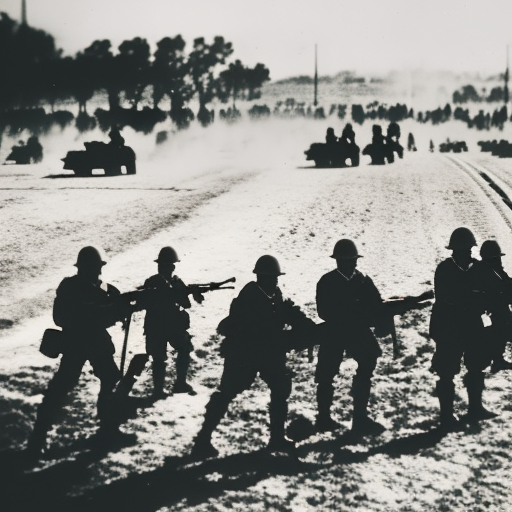Battle of Coronel: A Naval Clash in World War I
The Battle of Coronel was a naval engagement that took place on November 1, 1914, during World War I. It was fought between the British Royal Navy and the Imperial German Navy off the coast of Coronel, Chile. The German fleet, led by Vice Admiral Maximilian von Spee, achieved a decisive victory over the British squadron commanded by Rear Admiral Sir Christopher Cradock. This battle marked a significant early success for the German Navy in the war.
The Naval Forces
The British squadron consisted of the armored cruisers HMS Good Hope and HMS Monmouth, the light cruiser HMS Glasgow, and the armed merchant ships Otranto and Macedonia. The German fleet, on the other hand, comprised the armored cruisers SMS Scharnhorst and SMS Gneisenau, the light cruisers SMS Leipzig and SMS Nürnberg, and the auxiliary cruiser SMS Dresden.
The Battle
The battle began in the late afternoon when the two fleets spotted each other. Cradock, realizing that his ships were outgunned and outmatched, attempted to disengage and retreat. However, von Spee’s fleet pursued the British squadron, relentlessly closing the distance. The German ships, armed with larger guns and superior armor, quickly gained the upper hand.
Decisive German Victory
The first casualty of the battle was the HMS Monmouth, which was quickly disabled and sunk by the combined fire of the German cruisers. The HMS Good Hope, Cradock’s flagship, also suffered heavy damage and eventually exploded, taking the admiral and his crew down with it. The HMS Glasgow and the two armed merchant ships managed to escape, but the German fleet continued its pursuit.
Aftermath
The Battle of Coronel was a resounding victory for the German Navy. The British had lost two armored cruisers and over 1,600 men, while the Germans suffered minimal casualties and only minor damage to their ships. The defeat shocked the British Empire and highlighted the vulnerability of its naval forces in distant waters.
Impact on World War I
The German victory at Coronel had both immediate and long-term consequences. In the short term, it allowed von Spee’s fleet to continue its operations in the Pacific, disrupting British shipping and commerce. However, the British quickly regrouped and dispatched a more powerful force, led by Vice Admiral Sir Frederick Sturdee, to hunt down and engage the German fleet.
The Battle of the Falkland Islands
Just over a month after Coronel, the British and German fleets clashed again at the Battle of the Falkland Islands. This time, the outcome was vastly different. Sturdee’s force, consisting of battlecruisers and armored cruisers, decisively defeated von Spee’s fleet, sinking all of the German ships and killing von Spee himself. The British victory at the Falkland Islands avenged their defeat at Coronel and eliminated the German threat in the Pacific.
Legacy
The Battle of Coronel remains an important event in naval history. It demonstrated the effectiveness of German naval tactics and the vulnerability of British forces in distant waters. The defeat at Coronel prompted the British to reassess their naval strategy and led to the strengthening of their presence in the Pacific. The battle also highlighted the significance of naval power in World War I and set the stage for future naval engagements in the conflict.












